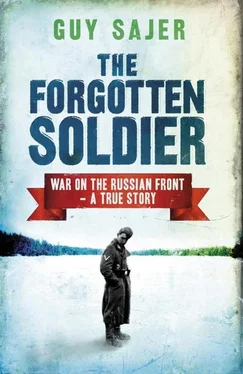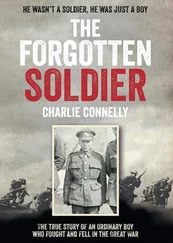Hals, Grandsk, Lindberg, and I had remained inseparable through all this, as in our worst moments. We understood only that the war had really ended for us, and had given no thought to the consequences of that fact. Everything was still too new, too much in the present. We knew that the worst was over, and that German ex-soldiers were organizing themselves to facilitate the task of the Allies, who had to count their prisoners and assign them to various jobs. Our men helping with this organization, often in rags, moved through the elegant ranks of the victors, attacking with them the same pressing necessities. Cigarettes were given to the prisoners, who had nothing to offer in return. Some even received chewing gum, which they chewed, laughing, and then swallowed by mistake. Orders were shouted in German, and ranks of men formed and broke up. Were they going to send us back to the line? That wouldn’t be possible. A bastard noncom, carried away by the spirit of things, absent-mindedly shouted at a group of prisoners: “Grab your weapons!”
He was answered by a howl of laughter.
This made the Americans angry, and they came outside to shout at us. This struck us as even funnier, but it was clear that we had to correct our attitude. The erring noncom, who suddenly realized his mistake, snapped to attention, expecting a reprimand. Three American officers protested in their language, hounding the delinquent, who was himself overcome with embarrassment.
A short while later, the prisoners were moving in long lines past a health inspection. Some were sent to a hospital, others to — an endless series of offices from which a recruiting service would send them out to take part in the first efforts at cleaning up a country in ruins. Control and verification commissions then studied each case. These commissions often included representatives of several Allied armies: Canadians, English, French, and Belgian. My scraps of paper fell to a French officer, who looked up at me twice. Then he looked up again, and spoke, at first, in German.
“Is this the date and place of your birth?”
“Ja.”
“Well?”
“Yes,” I answered, in French this time.
“My father is French.” My French was now almost as bad as my German had been at Chemnitz. The other looked at me with mistrust. After a moment he spoke again in French.
“Are you French, then?”
I didn’t know what to say. For three years the Germans had persuaded me that I was German.
“I think so, Herr Major.”
“What do you mean — you think so?”
I felt embarrassed, and made no reply.
“What the hell are you doing with this bunch?”
I still didn’t know what to say.
“I don’t know, Herr Major.”
“Don’t call me ‘Herr Major.’ I’m not ‘Herr Major.’ Call me ‘Mon Capitaine,’ and come with me.”
He stood up, and I had to follow him. From the ranks of dirty gray-green, I sensed Hals’s eyes fixed on me. I waved to him, and called softly. “Bleib hier, Hals. Ich komme wieder.”
“Who’s that you’re talking to?” the captain asked me, irritated.
“Das ist mein kamerad, Herr Kapitän.”
“Stop talking German, since you remember French. Come along this way.”
I followed him through a series of corridors, suddenly afraid that I wouldn’t be able to find Hals again. Finally, we arrived at an office where four French soldiers were talking and laughing with a young woman, who spoke to them in English, I think.
The captain said he had brought along a doubtful case. They put me through an extended interrogation, to which my answers must have sounded far from convincing. My head was spinning, and everything I said seemed to ring false.
One of them — also an officer — called me a bastard and a traitor. As I remained apathetic and absent, they gave up on me, sending me off to a small room on the floor below. For a day and a night they left me there, thinking of my companions in wretchedness, and especially of Hals, who must have been wondering about me. I felt a sinister premonition that I wouldn’t see him again, and a feverish restlessness kept me from sleeping.
The next morning, a lieutenant, who seemed in a very friendly mood, came to release me. I was taken back to the office of the day before and asked to sit down. This invitation was so unexpected that the words fell on my ears as if for the first time in my life.
Then the young lieutenant looked through my papers and spoke to me.
“Your story took us somewhat by surprise yesterday. Now we know that the Germans often forced young men with German fathers into their army. If that had been your case, we would have been obliged to keep you a prisoner for a while. However, with you it was the mother, and we cannot detain you. For your sake, I am glad,” he added gently.
“We have now liberated you, and this has been recorded on the papers I am handing back to you. You may return to your home, and resume your old life.”
“To my home!” He might just as well have been talking about the planet Mars.
“Yes, home.”
He paused for a moment, giving me an opportunity to speak, which I didn’t take. I couldn’t quite grasp what had happened, or find the proper words.
“Nevertheless, I would advise you to clear yourself by signing up for a term with the French Army, and in that way return to normal life in good order.”
My expression remained impenetrable. My thoughts above all were with Hals, and I only took in about half of what the amiable officer was saying. “Do you agree?”
“Oui, Mon Lieutenant,” I said, only partly aware of my own words.
“I congratulate you on your decision. Sign here.”
I signed my name, more interested by the French words than by their significance.
“You will be called up,” he said, closing my folder.
“Go home quickly and try to forget this adventure.”
I still didn’t know what to say. Even the lieutenant seemed to be losing his patience. He stood up anyway, and walked me to the door.
“Do your parents know where you are?”
“I don’t think so, Mon Lieutenant.”
“Didn’t you write to them?”
“I did, Mon Lieutenant.”
“Well, then — you must have had answers from them, too. Don’t the Boches have a post office?”
“Yes, Mon Lieutenant. They wrote to me too, but we haven’t had any mail for almost a year now.”
He looked at me in surprise.
“The bastards,” he said. “They wouldn’t even send you your mail. Go along now. Get yourself home, and try to forget all this as fast as you can.”
“Try to forget…”
In the train, rolling through the sunny French countryside, my head knocked against the wooden back of the seat. Other people, who seemed to belong to a different world, were laughing. I couldn’t laugh and couldn’t forget.
I had looked everywhere for Hals, but hadn’t been able to find him. He filled my thoughts, and only my acquired ability to hide my feelings kept me from weeping. He was attached to me by all the terrible memories of the war, which still rang in my ears. He was my only friend in this hostile world, the man who had so often carried my load when my strength was failing. I would never be able to forget him, or the experiences we had shared, or our fellow soldiers, whose lives would always be linked to mine.
The train rolled on, carrying me minute by minute farther away from all that. If it had gone on like that for days, and carried me to the other side of the earth, it would still have made no difference. My memories would have remained at my side.
Then there was a station. My worn boots, which had tramped across Russia, scraped against the cement platform, and my disillusioned eyes took in the details of a place I knew well. Nothing had changed. The place seemed to be sleeping, although the unexpectedness of my arrival might very well have awakened it. Everything looked as it had; only I had changed, and I knew very well that I would not be able to fit myself in.
Читать дальше












